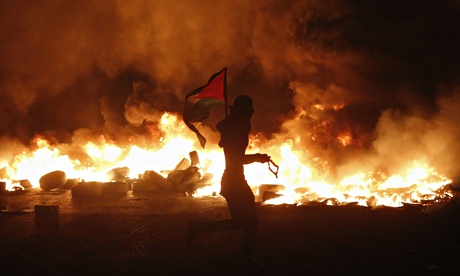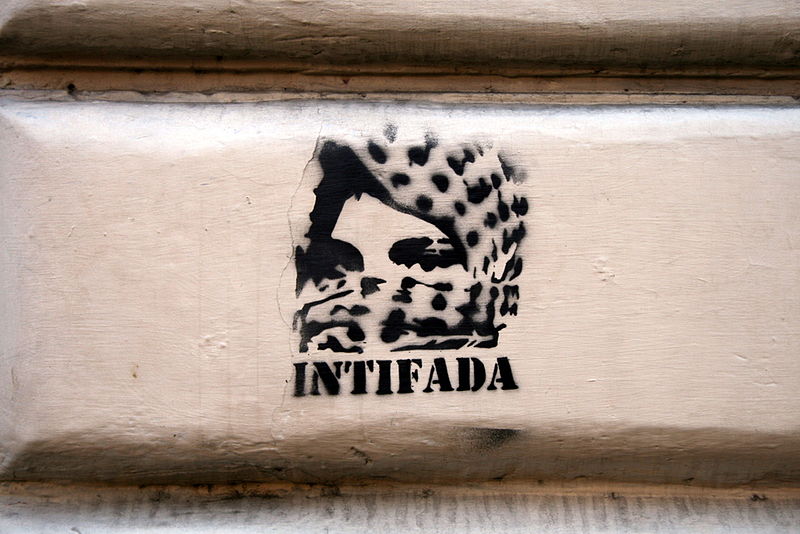
A protester holds a Palestinian flag at a barricade of burning tyres during clashes with Israeli troops at the Qalandiya checkpoint. Photograph: Mohamad Torokman/Reuters

Ramallah doctor says 'We have seen this before but not since the intifada' as hospital treats 250 injured with gunshot wounds
On his 17th birthday, instead of celebrating at home with his family, Mohammed al-Araj made the fateful decision to join thousands of others on the West Bank in a protest over spiralling civilian deaths in Gaza, 50 miles away. As the violence that has consumed that tiny strip of land for the past 18 days ignited in the West Bank and East Jerusalem, Araj met his own premature and brutal end.
The young chef from Darna, one of Ramallah's best known restaurants, was shot dead in clashes between protesters and Israeli forces at the notorious Qalandiya checkpoint. At his funeral on Friday, squeezed between the noon prayers and the start of more confrontations, a family friend said he had seen Araj's body in the morgue. "No one could recognise him – the bullet had destroyed his face," said Raja Hananiya, 37, adding that he was "a nice boy, always smiling and joking".
Outside the Qalandiya refugee camp, where Araj was buried on the final Friday of the Muslim holy month of Ramadan, fresh tyres for burning had been placed on the main road leading to the checkpoint amid rubble, broken glass, scorched debris and the spent live ammunition cases from the night before.
By mid-afternoon, at least five more Palestinians had been killed, bringing the death toll to seven, and Ramallah's public hospital, already reeling from the 250 or so injured people who were brought in on Thursday night, was braced for a fresh influx.
Nearly all the injuries were gunshot wounds to the head, chest, stomach and limbs, and four or five people were still in intensive care, said a doctor in the hospital's emergency department, who was not authorised to speak to the media. "Ambulances were coming every minute. We have seen this before but not since the intifada," he said, referring to the Palestinian uprising from 2000 to 2005.
Thursday night's protest against the Israeli military onslaught in Gazaand the rising civilian death toll was the largest seen in the West Bank since the second intifada, with estimates varying from 10,000 to 25,000. Unusually, women, children and the elderly joined the march from Ramallah to Qalandiya, where some tried to breach the heavily manned checkpoint in an effort to reach Jerusalem.
"We went to show solidarity with the people of Gaza," said Mahmoud Amar, 27. "We are very angry about what's happening in Gaza –specifically the shelling of the [UN] school, and the killing of civilians in general."
But, according to Amar and others, the protest also reflected the mounting frustration of Palestinians in the West Bank over the continued Israeli occupation and diminishing hopes for a Palestinian state. "People are exploding," said Amar.
The gym trainer said he had no political affiliation, but support for Hamas was "up about 200%". The militant group's resistance to Israel's military campaign "is giving us a boost, bringing pride and dignity to our people," he said, adding that he would join protests again "today and everyday".
As Araj's body, wrapped in a Palestinian flag and adorned with flowers, was carried aloft from the mosque to the cemetery, Mohammed Assaf, 15, struggled with crutches and a bandaged leg to keep up with the crowd.
He had been throwing stones at soldiers at the checkpoint when they opened fire with live ammunition. A bullet fragment struck his leg. "Everybody joined the protest. There was no one left in the camp," he said. "Hamas are heroes."
On Friday, four Palestinians were killed in clashes with Israeli security forces, and a fifth appeared to have been shot dead by a settler.
Two, aged 21 and 22, were shot during a protest in the village of Hawara near Nablus in the north of the West Bank, said Mazen al-Hammouz, director of the city's Rafidiyeh hospital. Another three, one aged 47 and another 27, were shot in Beit Omar, near the city of Hebron, in the south.
In Iran, hundreds of thousands of people took part in nationwide rallies in solidarity with Palestinians. Images showed demonstrators holding banners, such as one reading "Stop killing babies in Gaza." A group of demonstrators set fire to Israeli flags and carried effigies of Israeli and American politicians.
Iran's president, Hassan Rouhani, was among many senior officials who participated in rallies.
Earlier in the week a group of prominent opposition activists in Iran, many of whom have endured lengthy jail terms in recent years, protested in support of Gaza in front of the UN offices in Tehran. The celebrated film-maker Jafar Panahi was among them.
Iran's Nobel peace prize laureate, Shirin Ebadi, a lawyer and human rights activist who currently lives in exile, also expressed serious concerns.
"Deliberate targeting of civilian areas by anyone is a violation of international law," she said in a joint statement signed by other female Nobel laureates. "Israel's continuing collective punishment of the Palestinian people because of its ongoing war of attrition against Hamas is a war crime."
About 2,000 people protested in Jordan's capital, Amman, after Friday prayers, chanting: "We sacrifice our blood and souls for you, Gaza" and "Bomb and destroy Tel Aviv". Protests were held in the northern cities of Zarqa and Irbid as well as in the south, in Karak.
Back in the Ramallah hospital, extra medical staff had been called in and operating theatres prepared for another night of violence. "We are ready," said the young emergency doctor as another ambulance screeched to a halt outside with its siren blaring.

No comments:
Post a Comment